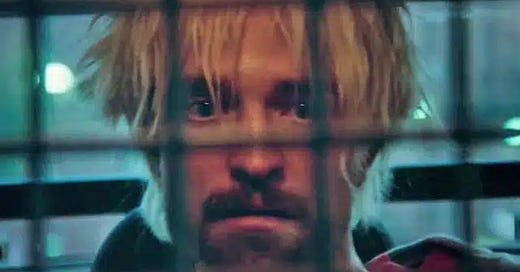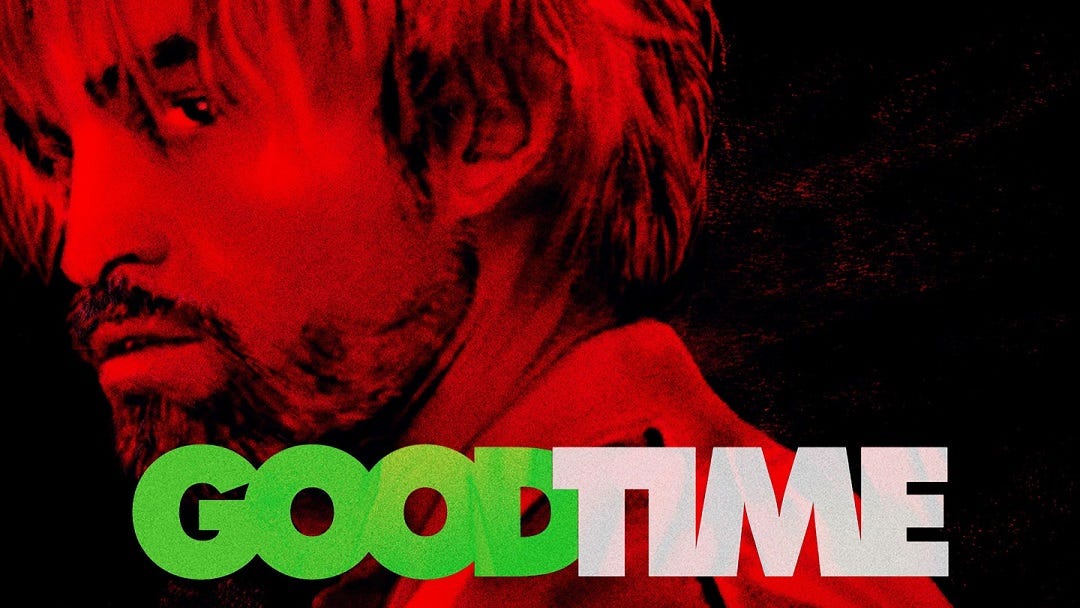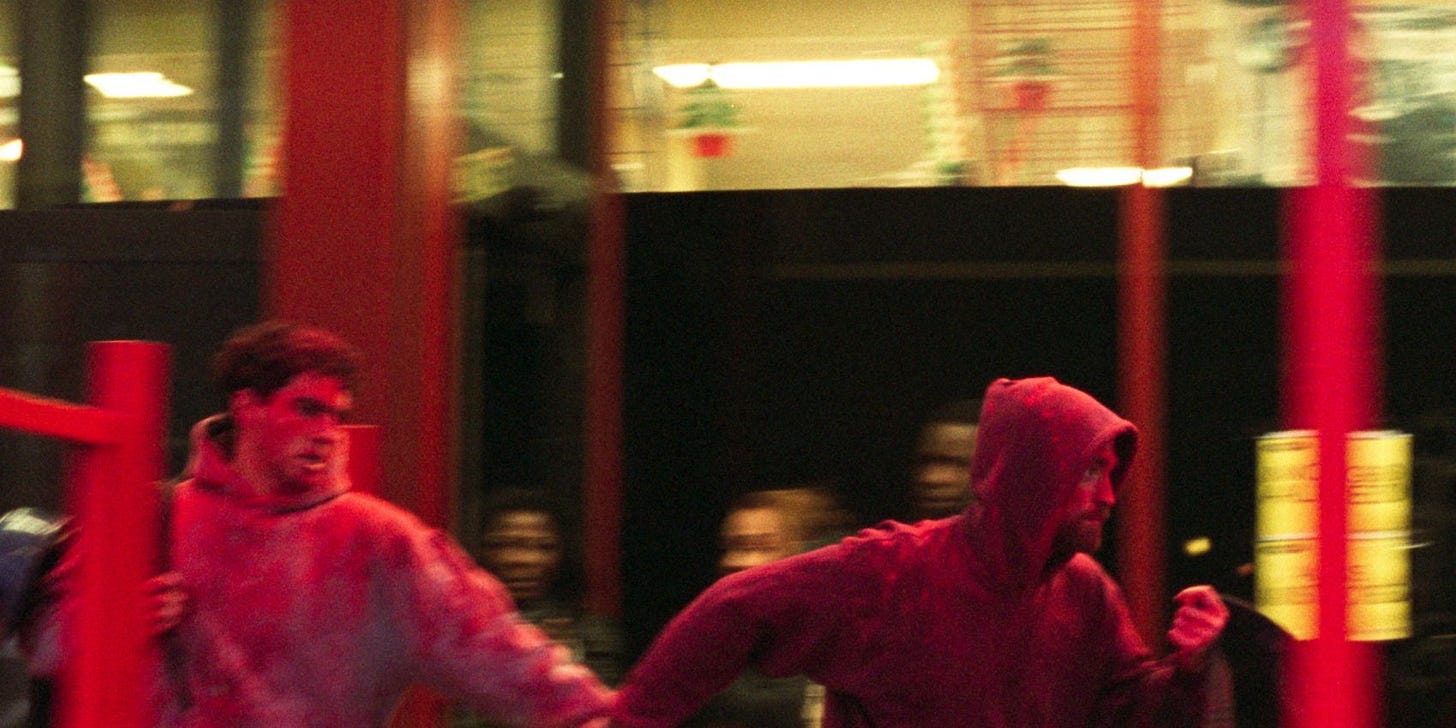The film Good Time (2017) is in fact a good time, at least to watch (certainly not to live through), at least if you're into movies that are basically rollercoasters with zero breaks or reprieves, thrill rides that only get progressively faster and more serpentine and anxiety-inducing and stomach-turning. And the ending is a cliff; not a cliffhanger, but a cliff, literally, and it's not very soothing and cathartic and feelgood, but nevertheless you can't deny that the whole experience is gripping.
That's the kind of movie the Safdie brothers are known for. If you've seen their more recent film, Uncut Gems (2021), then you know what I'm talking about. Their whole style could basically be described as 'stress distilled.' As if you could buy it as an over-the-counter medication, and take it as needed.
If you haven't seen Good Time, I highly recommend you watch it, and then come back to this essay. I'm going to spoil a lot of the film in order to make the arguments in this essay.
Without saying too much, it's basically about a heist gone wrong, and how a small-time criminal (who is too clever for his own good) continually attempts to pull things back together, but in doing so, he commits more and more egregious crimes, causing more and more chaos as his spree runs rampant.
What I want to talk about is how Good Time explores four different themes, taking each of them to the end of the line, through opposites of opposites.1 In doing so, it elevates the story, taking it from something simply compelling and transforming it into a work of art, worthy of our contemplation and discussion.
Last chance: SPOILERS below!
1. Popular vs. Pariah
The opening shot shows us the focus of the film, Nick Nikas (Benny Safdie), the brother of our protagonist Connie Nikas (Robert Pattison). Even though Nick is absent for much of the movie, he is the motivation for all of Connie's actions.
It's unclear exactly what disability Nick has, but he appears to have cognitive, auditory, and social deficits. In other words, he's retarded. And our reticence as a society to call this disability by its original name is the same mistake that Connie makes— his refusal to recognize that Nick is not like him, not like other people, and that he needs special care. He is not just deficient, but disabled. And this misunderstanding causes him to lead Nick into dangerous situations that cause him further trauma.
Although Nick is mentally feeble, he is physically imposing. Yet he is also incredibly shy. Unwilling to open up, and unable to explain his own feelings. The dissimilarity between these two qualities is shocking. It's hard to understand exactly who Nick is, and how he operates, and where he belongs. He's an outlier.
In contrast WHAM here comes Connie, breaking down the door, yelling, already offended even though he doesn't even know what's going on, self-certain, pulling his brother out of this "dangerous" psycho-babble-brainwashing.
The contrast between these two characters creates an interesting tension for the story, and it’s one of the four major themes that infuses the film with flavor.
Connie is a smooth criminal (for the most part), quick-witted, bold, and charismatic. He's good- looking. Most people fall under his spell and do what he wants. He is able to convince Nick to commit a felony crime, his girlfriend (Jennifer Jason Leigh) to lend him money despite her mother's resistances, a police officer to leave his post, a bus driver to give him a free ride, an elderly woman to let him stay in her home, a teenage girl (Taliah Webster) to sleep with him and then to steal her grandmother's car, a criminal (Buddy Duress) to lead him back to a hidden stash of drugs, and a dealer to come over to buy it.
Connie is popular. Or so he thinks. At the very least, he's good with people. And it's clear that it bothers him that his brother Nick doesn't fit in. But Connie obviously doesn't understand his brother's deficits. He thinks he's just a little "different." What he fears is that Nick will become the opposite of popular— a pariah. An outcast, someone bullied and taken advantage of by others. So he tries to protect Nick.
Most of us fall somewhere in between. We were neither the most popular kids in school, nor were we the biggest dorks. The truth is that both Connie and Nick are also somewhere in the middle ground. Connie is not as popular or persuasive as he would like to think, nor is Nick as repellent and unpopular as he fears. What's best for Nick is for him to find his own path, probably through group therapy in a school/home for people with similar disabilities.
The problem is that by seeing the world through this dichotomy of popular versus pariah, Connie's actions are extreme, out of proportion, and he ends up becoming the opposite of the opposite— he is a manipulator, a cancer to society. He uses his popularity and influence not for good but for evil, and along the way hurts several people, especially his brother, whom he cares for the most.
2. Selfishness vs. Service
Connie legitimately believes he is doing the right thing. What's interesting about Good Time is how seductively it pulls us into Connie's thinking too. We are rooting for him, despite all the horrible shit he's doing. He's a bad dude. But we don't really see this, not until the end of the movie when we begin to realize that it's not going to work out.
Connie is deluded the entire film. thinking that he is serving Nick and others. Connie "rescues" Nick in the opening scene, thinking that he doesn't need therapy. Then he compels Nick to join him on the heist, thinking that it will be good for both of them, that it will be a bonding experience ("you did great in there!"), and that the money will provide them with everything they need to have a comfortable life (maybe even to "fix" Nick's problems). This seems like love, but it is not.
Then when Nick is imprisoned, he thinks he is trying to help by bailing him out. Which is actually the best thing for him, as we clearly see when he gets beat up. However, the way Connie goes about it, by manipulating his girlfriend (into manipulating her mom) is very selfish. He doesn't care about the impact it will have on her, or her relationship with her mom.
So then, he has to break Nick out of the hospital. Once again, it seems like a good idea. But what Nick really needs is medical treatment, to stay in the hospital. And maybe even by the time he is healed, the staff of the jail will realize that he is not fit for general population imprisonment. And moreover, they will realize that he doesn't belong in jail at all, that actually he needs therapy, since he was coerced into committing the crime.
Nevertheless, when this plot fails, and Connie discovers that he accidentally rescued Jay instead, he continues to manipulate other people into helping him— all with the "selfless" motive of getting back to Nick. But as we see how each of these people are harmed through him, we learn the bitter truth about his motives. While most of us are neither purely selfish nor purely selfless (we are a mix of both), Connie is once again the opposite of the opposite— selfishness perceived as service.
If Connie had truly been willing to serve others, he would have turned himself in— and served his time. That would have set Nick free, and it would have prevented all the other damages that he did during his spree. Instead, his selfish motives carried him further and deeper into pandemonium, only hurting Nick more in the long run.
3. Chaos vs. Control
But he is oblivious to his journey down the rabbit hole. Perhaps this is because failure is so uncharacteristic of him. You see, Connie is extremely clever and tends to operate effectively, despite his tendency to get enraged. For example, when we first meet him, he is already yelling and upset. Nevertheless, he gets what he wants, without much of a fight. He takes Nick out of therapy and brings him under his wing.
When they begin their heist, everything goes well. They get in, get out, and get away with it... but then all hell breaks loose. Connie escapes; Nick gets locked up.
Ok, a misstep, but not unsolvable. Connie thinks he can right the situation, and regain control. All he has to do is pay the bail. But then, he realizes he doesn't have enough money. So he adapts, and makes a new plan.
At each point in the journey, Connie makes a move that seems like it will work, and as long as it goes according to plan, everything will be fine. But, in fact, each of his choices only makes things worse, creating more chaos, which will require even more aggressive action in order to regain control.
If only he can convince his girlfriend to get the money
But it doesn't and she gets into a fight with her mom
If only he can rescue Nick from the hospital
But it's not Nick, it's Jay
If only he can make a phone call to his girlfriend to pick them up
But she doesn't answer
If only he can seduce Crystal, she won't see the news
But Jay wakes up and causes a ruckus
If only he can get the LSD from the carnival
But the security guard (Barkhad Abdi) stops them
If only he can sell the LSD, he can pay the bond
But the cops are onto him
These are just a few of the major turning points in the story, but there are dozens of more incidents. At each point, Connie is trying to regain control, but his actions backfire, only causing more chaos. Again, another opposite of the opposite: this is chaos perceived as control. No matter what he tries to do, it's too late; things have gotten out of hand.
It's like someone driving a car on an icy road who has started to drift, but now he's oversteering in the other direction, and he's drifting even more, so he steers back in the original direction, and so on... All he needs to do is stop. Surrender. Admit that he's lost control. But instead, he ends up radically steering in every which way, ultimately ending in a crash, with a lot of other people hurt in the accident.
4. Crime vs. victim
And all of those people are victims, though Connie is unable to see this. Typically, we establish crimes because there is a victim who needs to be protected or who deserves restitution, but Robin Hood exemplifies the idea of a victimless crime: the rich don't really need the extra money; they won't even miss it. While the poor who receive this stolen money are in desperate need.
So likewise Connie believes his actions are victimless, and therefore he's not guilty of any crime. The heist is a perfect example of this mentality— the bank won't miss it; they're insured. And the teller won't lose her job either.
And you can see this mentality throughout the rest of the film: Connie also believes that stealing his brother from the hospital is fine (he's not guilty), so is riding in the wheelchair van (it's already taking people), so is using the lady's home as a place to stay (she's offering her empty room), so is manipulating Crystal (she wants him), so is assaulting and drugging the security guard (he'll be fine), and using his apartment, and selling the LSD that was lost, and on and on. He has a justification for each of these actions. And with is ultimate goal of recovering Nick, how can any of these actions be crimes?
The opposite of law-abiding is law-breaking, and Connie believes he is somewhere in between, with the concept of the victimless crime— as long he gets away with it, no one gets hurt. But the irony is that he has now reached the fourth opposite of the opposite— hurting everyone in his path, in deep and irreparable ways, including and especially, Nick. And, of course, he doesn’t get away with it.
Nick is further traumatized from the whole spree— his encounter with the dye bomb, his incarceration, his assault in prison, and his stint in the hospital, not to mention all the lost time when he should have been in therapy. And Jordan is once more distrusted by her mom. The wheelchair van is taken out of service because it's now a crime scene. Crystal is raped (legally speaking), and arrested. The security guard is drugged and taken to the hospital. And finally, Jay dies.
Conclusion
At first, when I saw the ending of Good Time, I was disappointed, because I thought it would have been more appropriate or just if Connie was the one who died from a fall, rather than Jay. Or at the very least, we should see him end up in jail. Instead, we only see him in custody in the back of the police cruiser. This, to me, seemed inadequate punishment for his reckless behavior.
But, of course, the film can't settle for anything predictable, it has to go to the end of the line, just as we have seen with each of the four themes above. Each of these adds a layer of complexity to the film that makes it all the more satisfying. It's not just a thrill ride that ends in a disaster, but a story that explores the unexpected consequences of our best intentions.
So with that in mind, the ending is actually perfect. It's implied from Connie's insane, unblinking stare into the camera that he is beginning to reckon with the full significance of his actions, realizing that he will not get away with it, and things cannot return to the way they were.
Regardless of his final punishment— whether life in prison or the death penalty— perhaps the best penalty for his crimes against humanity is being forced to live with the recognition of all the harm he has caused, through the perversion of all these values. He helped no one, not even himself, and only caused pain, most of all to the one whom he loved, his justification for everything.
It was all wrong.
I explored this concept in this essay
Opposites of opposites
I drive a taxi at night. I take the dirtiest, vilest people from place to place, wherever they want to go, on whatever awful mission they have planned. And I help them. The city is decaying, the people and the streets, a slow rot, a festering sore, a putrid landfill. Nighttime is the worst, because all the fiends come out. I let them ride in my cab, I t…











I was finally able to calmly read it and this was great, Grant. Spot on with those 4 "vs", a more profound analysis that I could ever make of it. I might add a 5th one, "addiction vs. letting go": while reading your essay I kept thinking about Uncut Gems, which I saw more recently, and thought these two opposites apply in both movies and believe is a major theme in their power-house collaboration. How your addiction to something (money, fame, "helping", adrenaline/thrills...) affects your worldview and actions, and what happens when you let (it) go?
I loved how you described the ending as a "cliff" and the Safdie brother's style as "stress distilled", spot on. It definitely applies to most of their movies together.
Also, I've been loving what Benny Safdie is doing by himself, especially with Nathan Fielder (another of my heroes), have you seen the series The Curse? A masterpiece in my opinion, and right down my alley with unclassifiable and very meta material.
Anyway, keep these movie analysis coming!
Finally watched Good Time, and I am glad I read this afterwards!